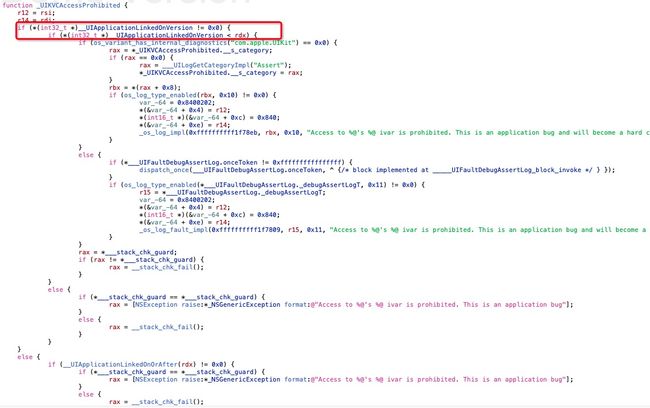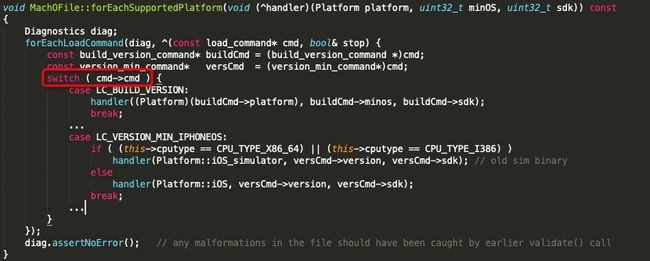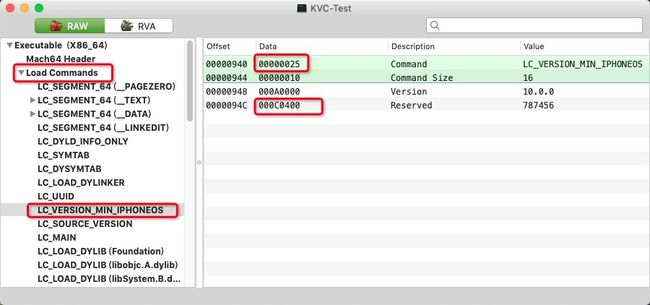前提## 前提
这段时间升级了 Xcode11.0,在 iOS13.0 运行的时候,当运行到 [textField setValue:color forKeyPath:@"_placeholderLabel.textColor"] 崩溃了,抛出了KVC错误
*** Terminating app due to uncaught exception 'NSGenericException', reason: 'Access to UITextField's _placeholderLabel ivar is prohibited. This is an application bug'
在 iOS13 中,不再允许通过 KVC 的方式去访问私有属性,需要通过其他方式修改。
目前我找到的会触发 KVC 访问权限异常崩溃的方法有:
- UITabBarButton ->
_info - UITextField ->
_placeholderLabel - _UIBarBackground ->
_shadowView - _UIBarBackground ->
_backgroundEffectView - UISearchBar ->
_cancelButtonText - UISearchBar ->
_cancelButton - UISearchBar ->
_searchField
在网上看到有人说 私有KVC崩溃与系统版本无关,与Xcode版本有关,Xcode11编译会崩溃
这个说法是错的,接下来主要拿 UITextField 和 UISearchBar 的 KVC 崩溃做讲解
分析
UITextField - _placeholderLabel
UITextField *tf = [UITextField new];
[tf valueForKey:@"_placeholderLabel"];
先将上面的代码分别在 Xcode10.3,Xcode11.0,iOS12.4,iOS13上运行,看看运行结果:
- Xcode10.3 - iOS12.4: ✅
- Xcode10.3 - iOS13: ✅
- Xcode11.0 - iOS12.4: ✅
- Xcode11.0 - iOS13.0: ❌
只有在 Xcode11.0 - iOS13.0 上运行会抛出 KVC 异常,通过堆栈发现,异常是在 -[UITextField valueForKey:] 中抛出的
![## 前提
这段时间升级了 Xcode11.0,在 iOS13.0 运行的时候,当运行到 [textField setValue:color forKeyPath:@"_placeholderLabel.textColor"] 崩溃了,抛出了KVC错误
*** Terminating app due to uncaught exception 'NSGenericException', reason: 'Access to UITextField's _placeholderLabel ivar is prohibited. This is an application bug'
在 iOS13 中,不再允许通过 KVC 的方式去访问私有属性,需要通过其他方式修改。
目前我找到的会触发 KVC 访问权限异常崩溃的方法有:
- UITabBarButton ->
_info - UITextField ->
_placeholderLabel - _UIBarBackground ->
_shadowView - _UIBarBackground ->
_backgroundEffectView - UISearchBar ->
_cancelButtonText - UISearchBar ->
_cancelButton - UISearchBar ->
_searchField
在网上看到有人说 私有KVC崩溃与系统版本无关,与Xcode版本有关,Xcode11编译会崩溃
这个说法是错的,接下来主要拿 UITextField 和 UISearchBar 的 KVC 崩溃做讲解
分析
UITextField - _placeholderLabel
UITextField *tf = [UITextField new];
[tf valueForKey:@"_placeholderLabel"];
先将上面的代码分别在 Xcode10.3,Xcode11.0,iOS12.4,iOS13上运行,看看运行结果:
- Xcode10.3 - iOS12.4: ✅
- Xcode10.3 - iOS13: ✅
- Xcode11.0 - iOS12.4: ✅
- Xcode11.0 - iOS13.0: ❌
只有在 Xcode11.0 - iOS13.0 上运行会抛出 KVC 异常,通过堆栈发现,异常是在 -[UITextField valueForKey:] 中抛出的
UITextField 属于系统UI库,而在 iOS13 中,UITextField 内部重写了 valueForKey: 方法,通过判断参数 key 是否为 _placeholderLabel 来决定是否访问了私有属性,下图是 iOS13 的 UIKitCore 中新增的 -[UITextField valueForKey:] 的汇编实现:
如果参数 key 等于字符串 _placeholderLabel,则调用 _UIKVCAccessProhibited() C函数决定是否抛出异常,这个函数放到下面再讲。而在 iOS12 的 UIKitCore 中,UITextField 是没有重写 valueForKey: 方法的,因此在 iOS12 上是不会抛出异常。既然 UITextField 内部是通过判断 key 是否等于_placeholderLabel 来抛出异常的,那么试试不加 "_":
UITextField *tf = [UITextField new];
[tf valueForKey:@"placeholderLabel"];
正常运行没报错~
在 iOS13 中,UITextField 只重写了 valueForKey:,没有重写 setValue:forKey:,因此下面的方法也是能正常运行的
UITextField *tf = [UITextField new];
[tf valueForKey:@"placeholderLabel"];
[tf setValue:nil forKey:@"placeholderLabel"];
[tf setValue:nil forKey:@"_placeholderLabel"];
如果要想继续获取 UITextField 的占位文本框,可以使用
placeholderLabel,不要加_
UISearchBar - _searchField
UISearchBar *sb = [UISearchBar new];
[sb valueForKey:@"_searchField"];
先将上面的代码分别在 Xcode10.3,Xcode11.0,iOS12.4,iOS13上运行,看看运行结果:
- Xcode10.3 - iOS12.4: ✅
- Xcode10.3 - iOS13: ✅
- Xcode11.0 - iOS12.4: ✅
- Xcode11.0 - iOS13.0: ❌
可能有人会认为,UISearchBar 内部也重写了 valueForKey: 方法,判断 key 值。看函数调用堆栈,是进入到 [UISearchBar _searchField] 方法才抛出异常的,而且 UISearchBar 内部并没有重写 valueForKey: 方法的
看汇编:
方法内部直接调用了 _UIKVCAccessProhibited() 函数,那为什么 iOS12 不会崩溃呢?
UISearchBar 在 iOS12 和 iOS13 上的实现略有不同。在 iOS13 中,UISearchBar 实现了 searchField,_searchField,searchTextField,_searchTextField,_searchBarTextField;在 iOS12 中,UISearchBar 实现了 searchField,_searchBarTextField
在 iOS13 中,UISearchBar 额外实现了 _searchField 方法,因此通过 _searchField 和 searchField 取值,分别调的是不同的方法。苹果为什么要这么做呢?我也不知道♂️。不过在 iOS13 中,UISearchBar 的私有变量不再是自己内部创建了,而是通过 _UISearchBarVisualProviderIOS 这个类来创建的,这个类是 iOS13 后才有的,估计是为了区分 iOS 系统和 iPadOS 系统吧
如果要想继续获取 UISearchBar 的输入框,可以使用
searchField,不要加_
在 iOS13 上,UIKitCore 这个系统共享UI库中,新增了 _UIKVCAccessProhibited 函数去限制了 KVC 访问权限控制,苹果之所以要私有属性也是不想我们去访问的,所以尽量不访问吧。说不定在以后的版本中,连 placeholderLabel 和 searchField 也不给访问了呢
分割线
提示:
下面的内容主要讲解的是 Xcode10 和 Xcode11 打的包,在 iOS13 上运行结果不一样的原因,其中涉及到了 MachO 和 DYLD 的知识了,有兴趣的可以继续看,没兴趣的就返回吧
_UIKVCAccessProhibited
这是在 iOS13 上才有的函数,因此拿 iOS13 模拟器中的 UIKitCore 分析,先看看Hopper反编译出来的伪代码吧
其中主要是拿全局变量 __UIApplicationLinkedOnVersion 和 寄存器 rdx 中的值做比较,寄存器 rdx 存储的是函数的第3个参数,在 [UITextField valueForKey:] 和 [UISearchBar _searchField] 中传入的值都为 0xd0000,值得注意的时候,汇编中用的是立即数,是固定的。
Xcode10 打的包运行在 iOS13 上不会崩溃,因此猜想 Xcode10 的包,__UIApplicationLinkedOnVersion 的值是比 0xd0000 小的,而 Xcode11 的包会抛出异常,那么 Xcode11 的包,__UIApplicationLinkedOnVersion 的值要大于等于 0xd0000
直接看 UIKitCore 的 MachO 文件的话,会发现 __UIApplicationLinkedOnVersion 的值为 0x0,即使不为 0x0,在运行时也会动态改变,否则没法区分 Xcode10 和 Xcode11
与 __UIApplicationLinkedOnVersion 配套出现的还有的 __UIApplicationLinkedOnVersionOnce,猜想代码中肯定会出现和类似的代码:
static dispatch_once_t __UIApplicationLinkedOnVersionOnce;
dispatch_once(&__UIApplicationLinkedOnVersionOnce, ^{
...
});
还真的在 -[UIApplication _runWithMainScene:transitionContext:completion:] 中找到了实现代码:
if (*(int32_t *)__UIApplicationLinkedOnVersion == 0x0) {
if (*__UIApplicationLinkedOnVersionOnce != 0xffffffffffffffff) {
dispatch_once(__UIApplicationLinkedOnVersionOnce, ^ {/* block implemented at _____UIApplicationLinkedOnOrAfter_block_invoke */ } });
}
}
void _____UIApplicationLinkedOnOrAfter_block_invoke(void * _block) {
*(int32_t *)__UIApplicationLinkedOnVersion = dyld_get_program_sdk_version(_block);
return;
}
看来全局变量 __UIApplicationLinkedOnVersion 的值是通过 dyld_get_program_sdk_version() 获取的。下载 DYLD 源码看看吧
// APIs.cpp
uint32_t dyld_get_program_sdk_version()
{
static uint32_t sProgramSDKVersion = 0;
if (sProgramSDKVersion == 0) {
sProgramSDKVersion = dyld3::dyld_get_sdk_version(gAllImages.mainExecutable());
}
return sProgramSDKVersion;
}
uint32_t dyld_get_sdk_version(const mach_header* mh)
{
__block bool versionFound = false;
__block uint32_t retval = 0;
dyld3::dyld_get_image_versions(mh, ^(dyld_platform_t platform, uint32_t sdk_version, uint32_t min_version) {
if (versionFound) return;
if (platform == ::dyld_get_active_platform()) {
versionFound = true;
switch (dyld3::dyld_get_base_platform(platform)) {
case PLATFORM_BRIDGEOS: retval = sdk_version + 0x00090000; return;
case PLATFORM_WATCHOS: retval = sdk_version + 0x00070000; return;
default: retval = sdk_version; return;
}
} else if (platform == PLATFORM_IOSSIMULATOR && ::dyld_get_active_platform() == PLATFORM_IOSMAC) {
//FIXME bringup hack
versionFound = true;
retval = 0x000C0000;
}
});
return retval;
}
void dyld_get_image_versions(const struct mach_header* mh, void (^callback)(dyld_platform_t platform, uint32_t sdk_version, uint32_t min_version))
{
Diagnostics diag;
const MachOFile* mf = (MachOFile*)mh;
if ( mf->isMachO(diag, mh->sizeofcmds + sizeof(mach_header_64)) )
dyld_get_image_versions_internal(mh, callback);
}
static void dyld_get_image_versions_internal(const struct mach_header* mh, void (^callback)(dyld_platform_t platform, uint32_t sdk_version, uint32_t min_version))
{
const MachOFile* mf = (MachOFile*)mh;
__block bool lcFound = false;
mf->forEachSupportedPlatform(^(dyld3::Platform platform, uint32_t minOS, uint32_t sdk) {
lcFound = true;
// If SDK field is empty then derive the value from library linkages
if (sdk == 0) {
sdk = deriveVersionFromDylibs(mh);
}
callback((const dyld_platform_t)platform, sdk, minOS);
});
// No load command was found, so again, fallback to deriving it from library linkages
if (!lcFound) {
dyld_platform_t platform = PLATFORM_IOSSIMULATOR;
uint32_t derivedVersion = deriveVersionFromDylibs(mh);
if ( platform != 0 && derivedVersion != 0 ) {
callback(platform, derivedVersion, 0);
}
}
}
void MachOFile::forEachSupportedPlatform(void (^handler)(Platform platform, uint32_t minOS, uint32_t sdk)) const
{
Diagnostics diag;
forEachLoadCommand(diag, ^(const load_command* cmd, bool& stop) {
const build_version_command* buildCmd = (build_version_command *)cmd;
const version_min_command* versCmd = (version_min_command*)cmd;
switch ( cmd->cmd ) {
case LC_BUILD_VERSION:
handler((Platform)(buildCmd->platform), buildCmd->minos, buildCmd->sdk);
break;
...
case LC_VERSION_MIN_IPHONEOS:
if ( (this->cputype == CPU_TYPE_X86_64) || (this->cputype == CPU_TYPE_I386) )
handler(Platform::iOS_simulator, versCmd->version, versCmd->sdk); // old sim binary
else
handler(Platform::iOS, versCmd->version, versCmd->sdk);
break;
...
)
handler(Platform::watchOS_simulator, versCmd->version, versCmd->sdk); // old sim binary
else
handler(Platform::watchOS, versCmd->version, versCmd->sdk);
break;
}
});
diag.assertNoError(); // any malformations in the file should have been caught by earlier validate() call
}
struct version_min_command {
uint32_t cmd; /* LC_VERSION_MIN_MACOSX or
LC_VERSION_MIN_IPHONEOS */
uint32_t cmdsize; /* sizeof(struct min_version_command) */
uint32_t version; /* X.Y.Z is encoded in nibbles xxxx.yy.zz */
uint32_t sdk; /* X.Y.Z is encoded in nibbles xxxx.yy.zz */
};
// Xcode: usr/include/mach-o/loader.h
struct load_command {
uint32_t cmd; /* type of load command */
uint32_t cmdsize; /* total size of command in bytes */
};
这里只取关键的函数,我对 dyld 也不熟,也是一步一步找进去的,如果笔者找错了,还望下方留言告知一下
笔者用的是iOS模拟器研究的,所以对于一些宏编译,只保留了模拟器相关的。SDK 的版本主要是通过 APP 的可执行文件获取的,即 MachO文件。
APP 的 SDK 版本是存储在 MachO 文件的加载命令 load command 中的,
LC_BUILD_VERSION = 0x32 LC_VERSION_MIN_IPHONEOS = 0x25
查看MachO文件:
SDK 版本取的是 Load Command 偏移12个字节后的4个字节,即取 0xD0000,该 MachO文件是通过 Xcode11 编译得到的,因此 Xcode11 编译的包,运行在 iOS 上,全局变量 __UIApplicationLinkedOnVersion 的值为 0xD0000,可以在代码中加入如下代码,测试结果:
extern NSInteger _UIApplicationLinkedOnVersion;
NSLog(@"%lx", (long)_UIApplicationLinkedOnVersion);
打印结果为
d0000
Bingo!!!!!
Xcode10 编译运行后的打印结果为:c0400,MachO文件中的值也确实为 0xC0400
END
所以同样的代码[textField valueForKey:@"_placeholderLabel"] 同样运行在 iOS13 上,用 Xcode10 编译的包不会崩溃,用 Xcode11 编译的包会崩溃,不仅是因为 iOS13 的系统内部实现变了,还和编译时所用的 SDK 版本有关
Fix:10.25 之前的图片有点错乱,重新补图
作者:kwdx
链接:https://www.jianshu.com/p/fefef4ecd763
来源:
著作权归作者所有。商业转载请联系作者获得授权,非商业转载请注明出处。
](//upload-images.jianshu.io/upload_images/3488607-d3969202cf7c0bf9.png?imageMogr2/auto-orient/strip|imageView2/2/w/814/format/webp)
UITextField 属于系统UI库,而在 iOS13 中,UITextField 内部重写了 valueForKey: 方法,通过判断参数 key 是否为 _placeholderLabel 来决定是否访问了私有属性,下图是 iOS13 的 UIKitCore 中新增的 -[UITextField valueForKey:] 的汇编实现:
如果参数 key 等于字符串 _placeholderLabel,则调用 _UIKVCAccessProhibited() C函数决定是否抛出异常,这个函数放到下面再讲。而在 iOS12 的 UIKitCore 中,UITextField 是没有重写 valueForKey: 方法的,因此在 iOS12 上是不会抛出异常。既然 UITextField 内部是通过判断 key 是否等于_placeholderLabel 来抛出异常的,那么试试不加 "_":
UITextField *tf = [UITextField new];
[tf valueForKey:@"placeholderLabel"];
正常运行没报错~
在 iOS13 中,UITextField 只重写了 valueForKey:,没有重写 setValue:forKey:,因此下面的方法也是能正常运行的
UITextField *tf = [UITextField new];
[tf valueForKey:@"placeholderLabel"];
[tf setValue:nil forKey:@"placeholderLabel"];
[tf setValue:nil forKey:@"_placeholderLabel"];
如果要想继续获取 UITextField 的占位文本框,可以使用
placeholderLabel,不要加_
UISearchBar - _searchField
UISearchBar *sb = [UISearchBar new];
[sb valueForKey:@"_searchField"];
先将上面的代码分别在 Xcode10.3,Xcode11.0,iOS12.4,iOS13上运行,看看运行结果:
- Xcode10.3 - iOS12.4: ✅
- Xcode10.3 - iOS13: ✅
- Xcode11.0 - iOS12.4: ✅
- Xcode11.0 - iOS13.0: ❌
可能有人会认为,UISearchBar 内部也重写了 valueForKey: 方法,判断 key 值。看函数调用堆栈,是进入到 [UISearchBar _searchField] 方法才抛出异常的,而且 UISearchBar 内部并没有重写 valueForKey: 方法的
看汇编:
方法内部直接调用了 _UIKVCAccessProhibited() 函数,那为什么 iOS12 不会崩溃呢?
UISearchBar 在 iOS12 和 iOS13 上的实现略有不同。在 iOS13 中,UISearchBar 实现了 searchField,_searchField,searchTextField,_searchTextField,_searchBarTextField;在 iOS12 中,UISearchBar 实现了 searchField,_searchBarTextField
在 iOS13 中,UISearchBar 额外实现了 _searchField 方法,因此通过 _searchField 和 searchField 取值,分别调的是不同的方法。苹果为什么要这么做呢?我也不知道♂️。不过在 iOS13 中,UISearchBar 的私有变量不再是自己内部创建了,而是通过 _UISearchBarVisualProviderIOS 这个类来创建的,这个类是 iOS13 后才有的,估计是为了区分 iOS 系统和 iPadOS 系统吧
如果要想继续获取 UISearchBar 的输入框,可以使用
searchField,不要加_
在 iOS13 上,UIKitCore 这个系统共享UI库中,新增了 _UIKVCAccessProhibited 函数去限制了 KVC 访问权限控制,苹果之所以要私有属性也是不想我们去访问的,所以尽量不访问吧。说不定在以后的版本中,连 placeholderLabel 和 searchField 也不给访问了呢
分割线
提示:
下面的内容主要讲解的是 Xcode10 和 Xcode11 打的包,在 iOS13 上运行结果不一样的原因,其中涉及到了 MachO 和 DYLD 的知识了,有兴趣的可以继续看,没兴趣的就返回吧
_UIKVCAccessProhibited
这是在 iOS13 上才有的函数,因此拿 iOS13 模拟器中的 UIKitCore 分析,先看看Hopper反编译出来的伪代码吧
其中主要是拿全局变量 __UIApplicationLinkedOnVersion 和 寄存器 rdx 中的值做比较,寄存器 rdx 存储的是函数的第3个参数,在 [UITextField valueForKey:] 和 [UISearchBar _searchField] 中传入的值都为 0xd0000,值得注意的时候,汇编中用的是立即数,是固定的。
Xcode10 打的包运行在 iOS13 上不会崩溃,因此猜想 Xcode10 的包,__UIApplicationLinkedOnVersion 的值是比 0xd0000 小的,而 Xcode11 的包会抛出异常,那么 Xcode11 的包,__UIApplicationLinkedOnVersion 的值要大于等于 0xd0000
直接看 UIKitCore 的 MachO 文件的话,会发现 __UIApplicationLinkedOnVersion 的值为 0x0,即使不为 0x0,在运行时也会动态改变,否则没法区分 Xcode10 和 Xcode11
与 __UIApplicationLinkedOnVersion 配套出现的还有的 __UIApplicationLinkedOnVersionOnce,猜想代码中肯定会出现和类似的代码:
static dispatch_once_t __UIApplicationLinkedOnVersionOnce;
dispatch_once(&__UIApplicationLinkedOnVersionOnce, ^{
...
});
还真的在 -[UIApplication _runWithMainScene:transitionContext:completion:] 中找到了实现代码:
if (*(int32_t *)__UIApplicationLinkedOnVersion == 0x0) {
if (*__UIApplicationLinkedOnVersionOnce != 0xffffffffffffffff) {
dispatch_once(__UIApplicationLinkedOnVersionOnce, ^ {/* block implemented at _____UIApplicationLinkedOnOrAfter_block_invoke */ } });
}
}
void _____UIApplicationLinkedOnOrAfter_block_invoke(void * _block) {
*(int32_t *)__UIApplicationLinkedOnVersion = dyld_get_program_sdk_version(_block);
return;
}
看来全局变量 __UIApplicationLinkedOnVersion 的值是通过 dyld_get_program_sdk_version() 获取的。下载 DYLD 源码看看吧
// APIs.cpp
uint32_t dyld_get_program_sdk_version()
{
static uint32_t sProgramSDKVersion = 0;
if (sProgramSDKVersion == 0) {
sProgramSDKVersion = dyld3::dyld_get_sdk_version(gAllImages.mainExecutable());
}
return sProgramSDKVersion;
}
uint32_t dyld_get_sdk_version(const mach_header* mh)
{
__block bool versionFound = false;
__block uint32_t retval = 0;
dyld3::dyld_get_image_versions(mh, ^(dyld_platform_t platform, uint32_t sdk_version, uint32_t min_version) {
if (versionFound) return;
if (platform == ::dyld_get_active_platform()) {
versionFound = true;
switch (dyld3::dyld_get_base_platform(platform)) {
case PLATFORM_BRIDGEOS: retval = sdk_version + 0x00090000; return;
case PLATFORM_WATCHOS: retval = sdk_version + 0x00070000; return;
default: retval = sdk_version; return;
}
} else if (platform == PLATFORM_IOSSIMULATOR && ::dyld_get_active_platform() == PLATFORM_IOSMAC) {
//FIXME bringup hack
versionFound = true;
retval = 0x000C0000;
}
});
return retval;
}
void dyld_get_image_versions(const struct mach_header* mh, void (^callback)(dyld_platform_t platform, uint32_t sdk_version, uint32_t min_version))
{
Diagnostics diag;
const MachOFile* mf = (MachOFile*)mh;
if ( mf->isMachO(diag, mh->sizeofcmds + sizeof(mach_header_64)) )
dyld_get_image_versions_internal(mh, callback);
}
static void dyld_get_image_versions_internal(const struct mach_header* mh, void (^callback)(dyld_platform_t platform, uint32_t sdk_version, uint32_t min_version))
{
const MachOFile* mf = (MachOFile*)mh;
__block bool lcFound = false;
mf->forEachSupportedPlatform(^(dyld3::Platform platform, uint32_t minOS, uint32_t sdk) {
lcFound = true;
// If SDK field is empty then derive the value from library linkages
if (sdk == 0) {
sdk = deriveVersionFromDylibs(mh);
}
callback((const dyld_platform_t)platform, sdk, minOS);
});
// No load command was found, so again, fallback to deriving it from library linkages
if (!lcFound) {
dyld_platform_t platform = PLATFORM_IOSSIMULATOR;
uint32_t derivedVersion = deriveVersionFromDylibs(mh);
if ( platform != 0 && derivedVersion != 0 ) {
callback(platform, derivedVersion, 0);
}
}
}
void MachOFile::forEachSupportedPlatform(void (^handler)(Platform platform, uint32_t minOS, uint32_t sdk)) const
{
Diagnostics diag;
forEachLoadCommand(diag, ^(const load_command* cmd, bool& stop) {
const build_version_command* buildCmd = (build_version_command *)cmd;
const version_min_command* versCmd = (version_min_command*)cmd;
switch ( cmd->cmd ) {
case LC_BUILD_VERSION:
handler((Platform)(buildCmd->platform), buildCmd->minos, buildCmd->sdk);
break;
...
case LC_VERSION_MIN_IPHONEOS:
if ( (this->cputype == CPU_TYPE_X86_64) || (this->cputype == CPU_TYPE_I386) )
handler(Platform::iOS_simulator, versCmd->version, versCmd->sdk); // old sim binary
else
handler(Platform::iOS, versCmd->version, versCmd->sdk);
break;
...
)
handler(Platform::watchOS_simulator, versCmd->version, versCmd->sdk); // old sim binary
else
handler(Platform::watchOS, versCmd->version, versCmd->sdk);
break;
}
});
diag.assertNoError(); // any malformations in the file should have been caught by earlier validate() call
}
struct version_min_command {
uint32_t cmd; /* LC_VERSION_MIN_MACOSX or
LC_VERSION_MIN_IPHONEOS */
uint32_t cmdsize; /* sizeof(struct min_version_command) */
uint32_t version; /* X.Y.Z is encoded in nibbles xxxx.yy.zz */
uint32_t sdk; /* X.Y.Z is encoded in nibbles xxxx.yy.zz */
};
// Xcode: usr/include/mach-o/loader.h
struct load_command {
uint32_t cmd; /* type of load command */
uint32_t cmdsize; /* total size of command in bytes */
};
这里只取关键的函数,我对 dyld 也不熟,也是一步一步找进去的,如果笔者找错了,还望下方留言告知一下
笔者用的是iOS模拟器研究的,所以对于一些宏编译,只保留了模拟器相关的。SDK 的版本主要是通过 APP 的可执行文件获取的,即 MachO文件。
APP 的 SDK 版本是存储在 MachO 文件的加载命令 load command 中的,
LC_BUILD_VERSION = 0x32 LC_VERSION_MIN_IPHONEOS = 0x25
查看MachO文件:
SDK 版本取的是 Load Command 偏移12个字节后的4个字节,即取 0xD0000,该 MachO文件是通过 Xcode11 编译得到的,因此 Xcode11 编译的包,运行在 iOS 上,全局变量 __UIApplicationLinkedOnVersion 的值为 0xD0000,可以在代码中加入如下代码,测试结果:
extern NSInteger _UIApplicationLinkedOnVersion;
NSLog(@"%lx", (long)_UIApplicationLinkedOnVersion);
打印结果为
d0000
Bingo!!!!!
Xcode10 编译运行后的打印结果为:c0400,MachO文件中的值也确实为 0xC0400
END
所以同样的代码[textField valueForKey:@"_placeholderLabel"] 同样运行在 iOS13 上,用 Xcode10 编译的包不会崩溃,用 Xcode11 编译的包会崩溃,不仅是因为 iOS13 的系统内部实现变了,还和编译时所用的 SDK 版本有关
Fix:10.25 之前的图片有点错乱,重新补图
作者:kwdx
链接:https://www.jianshu.com/p/fefef4ecd763
来源:
著作权归作者所有。商业转载请联系作者获得授权,非商业转载请注明出处。
这段时间升级了 Xcode11.0,在 iOS13.0 运行的时候,当运行到 [textField setValue:color forKeyPath:@"_placeholderLabel.textColor"] 崩溃了,抛出了KVC错误
*** Terminating app due to uncaught exception 'NSGenericException', reason: 'Access to UITextField's _placeholderLabel ivar is prohibited. This is an application bug'
在 iOS13 中,不再允许通过 KVC 的方式去访问私有属性,需要通过其他方式修改。
目前我找到的会触发 KVC 访问权限异常崩溃的方法有:
- UITabBarButton ->
_info - UITextField ->
_placeholderLabel - _UIBarBackground ->
_shadowView - _UIBarBackground ->
_backgroundEffectView - UISearchBar ->
_cancelButtonText - UISearchBar ->
_cancelButton - UISearchBar ->
_searchField
在网上看到有人说 私有KVC崩溃与系统版本无关,与Xcode版本有关,Xcode11编译会崩溃
这个说法是错的,接下来主要拿 UITextField 和 UISearchBar 的 KVC 崩溃做讲解
分析
UITextField - _placeholderLabel
UITextField *tf = [UITextField new];
[tf valueForKey:@"_placeholderLabel"];
先将上面的代码分别在 Xcode10.3,Xcode11.0,iOS12.4,iOS13上运行,看看运行结果:
- Xcode10.3 - iOS12.4: ✅
- Xcode10.3 - iOS13: ✅
- Xcode11.0 - iOS12.4: ✅
- Xcode11.0 - iOS13.0: ❌
只有在 Xcode11.0 - iOS13.0 上运行会抛出 KVC 异常,通过堆栈发现,异常是在 -[UITextField valueForKey:] 中抛出的
UITextField 属于系统UI库,而在 iOS13 中,UITextField 内部重写了 valueForKey: 方法,通过判断参数 key 是否为 _placeholderLabel 来决定是否访问了私有属性,下图是 iOS13 的 UIKitCore 中新增的 -[UITextField valueForKey:] 的汇编实现:
如果参数 key 等于字符串 _placeholderLabel,则调用 _UIKVCAccessProhibited() C函数决定是否抛出异常,这个函数放到下面再讲。而在 iOS12 的 UIKitCore 中,UITextField 是没有重写 valueForKey: 方法的,因此在 iOS12 上是不会抛出异常。既然 UITextField 内部是通过判断 key 是否等于_placeholderLabel 来抛出异常的,那么试试不加 "_":
UITextField *tf = [UITextField new];
[tf valueForKey:@"placeholderLabel"];
正常运行没报错~
在 iOS13 中,UITextField 只重写了 valueForKey:,没有重写 setValue:forKey:,因此下面的方法也是能正常运行的
UITextField *tf = [UITextField new];
[tf valueForKey:@"placeholderLabel"];
[tf setValue:nil forKey:@"placeholderLabel"];
[tf setValue:nil forKey:@"_placeholderLabel"];
如果要想继续获取 UITextField 的占位文本框,可以使用
placeholderLabel,不要加_
UISearchBar - _searchField
UISearchBar *sb = [UISearchBar new];
[sb valueForKey:@"_searchField"];
先将上面的代码分别在 Xcode10.3,Xcode11.0,iOS12.4,iOS13上运行,看看运行结果:
- Xcode10.3 - iOS12.4: ✅
- Xcode10.3 - iOS13: ✅
- Xcode11.0 - iOS12.4: ✅
- Xcode11.0 - iOS13.0: ❌
可能有人会认为,UISearchBar 内部也重写了 valueForKey: 方法,判断 key 值。看函数调用堆栈,是进入到 [UISearchBar _searchField] 方法才抛出异常的,而且 UISearchBar 内部并没有重写 valueForKey: 方法的
看汇编:
方法内部直接调用了 _UIKVCAccessProhibited() 函数,那为什么 iOS12 不会崩溃呢?
UISearchBar 在 iOS12 和 iOS13 上的实现略有不同。在 iOS13 中,UISearchBar 实现了 searchField,_searchField,searchTextField,_searchTextField,_searchBarTextField;在 iOS12 中,UISearchBar 实现了 searchField,_searchBarTextField
在 iOS13 中,UISearchBar 额外实现了 _searchField 方法,因此通过 _searchField 和 searchField 取值,分别调的是不同的方法。苹果为什么要这么做呢?我也不知道♂️。不过在 iOS13 中,UISearchBar 的私有变量不再是自己内部创建了,而是通过 _UISearchBarVisualProviderIOS 这个类来创建的,这个类是 iOS13 后才有的,估计是为了区分 iOS 系统和 iPadOS 系统吧
如果要想继续获取 UISearchBar 的输入框,可以使用
searchField,不要加_
在 iOS13 上,UIKitCore 这个系统共享UI库中,新增了 _UIKVCAccessProhibited 函数去限制了 KVC 访问权限控制,苹果之所以要私有属性也是不想我们去访问的,所以尽量不访问吧。说不定在以后的版本中,连 placeholderLabel 和 searchField 也不给访问了呢
分割线
提示:
下面的内容主要讲解的是 Xcode10 和 Xcode11 打的包,在 iOS13 上运行结果不一样的原因,其中涉及到了 MachO 和 DYLD 的知识了,有兴趣的可以继续看,没兴趣的就返回吧
_UIKVCAccessProhibited
这是在 iOS13 上才有的函数,因此拿 iOS13 模拟器中的 UIKitCore 分析,先看看Hopper反编译出来的伪代码吧
其中主要是拿全局变量 __UIApplicationLinkedOnVersion 和 寄存器 rdx 中的值做比较,寄存器 rdx 存储的是函数的第3个参数,在 [UITextField valueForKey:] 和 [UISearchBar _searchField] 中传入的值都为 0xd0000,值得注意的时候,汇编中用的是立即数,是固定的。
Xcode10 打的包运行在 iOS13 上不会崩溃,因此猜想 Xcode10 的包,__UIApplicationLinkedOnVersion 的值是比 0xd0000 小的,而 Xcode11 的包会抛出异常,那么 Xcode11 的包,__UIApplicationLinkedOnVersion 的值要大于等于 0xd0000
直接看 UIKitCore 的 MachO 文件的话,会发现 __UIApplicationLinkedOnVersion 的值为 0x0,即使不为 0x0,在运行时也会动态改变,否则没法区分 Xcode10 和 Xcode11
与 __UIApplicationLinkedOnVersion 配套出现的还有的 __UIApplicationLinkedOnVersionOnce,猜想代码中肯定会出现和类似的代码:
static dispatch_once_t __UIApplicationLinkedOnVersionOnce;
dispatch_once(&__UIApplicationLinkedOnVersionOnce, ^{
...
});
还真的在 -[UIApplication _runWithMainScene:transitionContext:completion:] 中找到了实现代码:
if (*(int32_t *)__UIApplicationLinkedOnVersion == 0x0) {
if (*__UIApplicationLinkedOnVersionOnce != 0xffffffffffffffff) {
dispatch_once(__UIApplicationLinkedOnVersionOnce, ^ {/* block implemented at _____UIApplicationLinkedOnOrAfter_block_invoke */ } });
}
}
void _____UIApplicationLinkedOnOrAfter_block_invoke(void * _block) {
*(int32_t *)__UIApplicationLinkedOnVersion = dyld_get_program_sdk_version(_block);
return;
}
看来全局变量 __UIApplicationLinkedOnVersion 的值是通过 dyld_get_program_sdk_version() 获取的。下载 DYLD 源码看看吧
// APIs.cpp
uint32_t dyld_get_program_sdk_version()
{
static uint32_t sProgramSDKVersion = 0;
if (sProgramSDKVersion == 0) {
sProgramSDKVersion = dyld3::dyld_get_sdk_version(gAllImages.mainExecutable());
}
return sProgramSDKVersion;
}
uint32_t dyld_get_sdk_version(const mach_header* mh)
{
__block bool versionFound = false;
__block uint32_t retval = 0;
dyld3::dyld_get_image_versions(mh, ^(dyld_platform_t platform, uint32_t sdk_version, uint32_t min_version) {
if (versionFound) return;
if (platform == ::dyld_get_active_platform()) {
versionFound = true;
switch (dyld3::dyld_get_base_platform(platform)) {
case PLATFORM_BRIDGEOS: retval = sdk_version + 0x00090000; return;
case PLATFORM_WATCHOS: retval = sdk_version + 0x00070000; return;
default: retval = sdk_version; return;
}
} else if (platform == PLATFORM_IOSSIMULATOR && ::dyld_get_active_platform() == PLATFORM_IOSMAC) {
//FIXME bringup hack
versionFound = true;
retval = 0x000C0000;
}
});
return retval;
}
void dyld_get_image_versions(const struct mach_header* mh, void (^callback)(dyld_platform_t platform, uint32_t sdk_version, uint32_t min_version))
{
Diagnostics diag;
const MachOFile* mf = (MachOFile*)mh;
if ( mf->isMachO(diag, mh->sizeofcmds + sizeof(mach_header_64)) )
dyld_get_image_versions_internal(mh, callback);
}
static void dyld_get_image_versions_internal(const struct mach_header* mh, void (^callback)(dyld_platform_t platform, uint32_t sdk_version, uint32_t min_version))
{
const MachOFile* mf = (MachOFile*)mh;
__block bool lcFound = false;
mf->forEachSupportedPlatform(^(dyld3::Platform platform, uint32_t minOS, uint32_t sdk) {
lcFound = true;
// If SDK field is empty then derive the value from library linkages
if (sdk == 0) {
sdk = deriveVersionFromDylibs(mh);
}
callback((const dyld_platform_t)platform, sdk, minOS);
});
// No load command was found, so again, fallback to deriving it from library linkages
if (!lcFound) {
dyld_platform_t platform = PLATFORM_IOSSIMULATOR;
uint32_t derivedVersion = deriveVersionFromDylibs(mh);
if ( platform != 0 && derivedVersion != 0 ) {
callback(platform, derivedVersion, 0);
}
}
}
void MachOFile::forEachSupportedPlatform(void (^handler)(Platform platform, uint32_t minOS, uint32_t sdk)) const
{
Diagnostics diag;
forEachLoadCommand(diag, ^(const load_command* cmd, bool& stop) {
const build_version_command* buildCmd = (build_version_command *)cmd;
const version_min_command* versCmd = (version_min_command*)cmd;
switch ( cmd->cmd ) {
case LC_BUILD_VERSION:
handler((Platform)(buildCmd->platform), buildCmd->minos, buildCmd->sdk);
break;
...
case LC_VERSION_MIN_IPHONEOS:
if ( (this->cputype == CPU_TYPE_X86_64) || (this->cputype == CPU_TYPE_I386) )
handler(Platform::iOS_simulator, versCmd->version, versCmd->sdk); // old sim binary
else
handler(Platform::iOS, versCmd->version, versCmd->sdk);
break;
...
)
handler(Platform::watchOS_simulator, versCmd->version, versCmd->sdk); // old sim binary
else
handler(Platform::watchOS, versCmd->version, versCmd->sdk);
break;
}
});
diag.assertNoError(); // any malformations in the file should have been caught by earlier validate() call
}
struct version_min_command {
uint32_t cmd; /* LC_VERSION_MIN_MACOSX or
LC_VERSION_MIN_IPHONEOS */
uint32_t cmdsize; /* sizeof(struct min_version_command) */
uint32_t version; /* X.Y.Z is encoded in nibbles xxxx.yy.zz */
uint32_t sdk; /* X.Y.Z is encoded in nibbles xxxx.yy.zz */
};
// Xcode: usr/include/mach-o/loader.h
struct load_command {
uint32_t cmd; /* type of load command */
uint32_t cmdsize; /* total size of command in bytes */
};
这里只取关键的函数,我对 dyld 也不熟,也是一步一步找进去的,如果笔者找错了,还望下方留言告知一下
笔者用的是iOS模拟器研究的,所以对于一些宏编译,只保留了模拟器相关的。SDK 的版本主要是通过 APP 的可执行文件获取的,即 MachO文件。
APP 的 SDK 版本是存储在 MachO 文件的加载命令 load command 中的,
LC_BUILD_VERSION = 0x32 LC_VERSION_MIN_IPHONEOS = 0x25
查看MachO文件:
SDK 版本取的是 Load Command 偏移12个字节后的4个字节,即取 0xD0000,该 MachO文件是通过 Xcode11 编译得到的,因此 Xcode11 编译的包,运行在 iOS 上,全局变量 __UIApplicationLinkedOnVersion 的值为 0xD0000,可以在代码中加入如下代码,测试结果:
extern NSInteger _UIApplicationLinkedOnVersion;
NSLog(@"%lx", (long)_UIApplicationLinkedOnVersion);
打印结果为
d0000
Bingo!!!!!
Xcode10 编译运行后的打印结果为:c0400,MachO文件中的值也确实为 0xC0400
END
所以同样的代码[textField valueForKey:@"_placeholderLabel"] 同样运行在 iOS13 上,用 Xcode10 编译的包不会崩溃,用 Xcode11 编译的包会崩溃,不仅是因为 iOS13 的系统内部实现变了,还和编译时所用的 SDK 版本有关
Fix:10.25 之前的图片有点错乱,重新补图
链接:https://www.jianshu.com/p/fefef4ecd763
。







